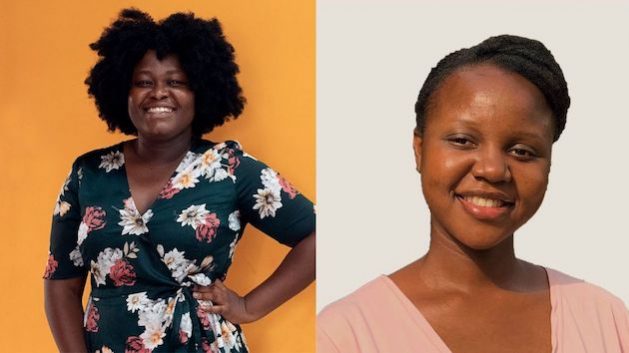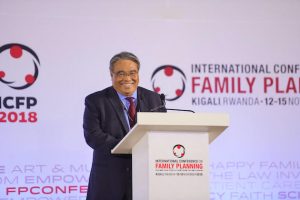
Featured, Gender, Global, Headlines, Population, Poverty & SDGs, TerraViva United Nations, Women’s Health, Youth Thought Leaders

Youth activists Peace Umanah, from Nigeria and Aurelia Naa Adjeley Sowah-Mensah from Ghana ensure that young people are made aware of their Sexual and Reproductive Health Rights. Credit: ICFP
– Travelling in northern Nigeria, Peace Umanah noticed teenage girls with multiple children – they would be walking with one strapped to their back, holding another by hand and with a protruding belly.
“These were worrisome sights that got me thinking about whether these young girls knew about contraceptive choices or if they were not given information to make beneficial decisions.”
The same question weighed heavily on young Aurelia Naa Adjeley Sowah-Mensah from Ghana, who grew up in a community where teenage pregnancies are common – mirroring the situation in many developing countries.
These questions set the young women on a trailblazing path to change the trajectory of adolescent and teenage pregnancies in their countries.
The pair have joined forces with other young people, world leaders and actors in Sexual and Reproductive Health and Rights (SRHR) to give young people in every corner of the world much-needed tools to navigate their sexuality. They hope to remove SRHR-related challenges to enable young women to benefit from socio-economic growth and development opportunities.
“Through the International Conference on Family Planning (ICFP) Youth Trailblazer Award, young leaders in the field of family planning and SRHR aged 18-35 years old were invited to submit creative short videos that integrate this year’s conference theme,” says Jose G Rimon II, director of the Bill and Melinda Gates Institute for Population and Reproductive Health at the Johns Hopkins Bloomberg School of Public Health.

Jose G Rimon II, director of the Bill and Melinda Gates Institute for Population and Reproductive Health at the Johns Hopkins Bloomberg School of Public Health. Credit: ICFP
Rimon II, who is also the chair of ICFP’s International Steering Committee, tells IPS the videos “also highlighted youth perspectives, experiences, and voices in family planning and SRHR”.
The videos reflected the conference’s theme: ‘Universal Health Coverage and Family Planning: Innovate, Collaborate, Accelerate’.
Sowah-Mensah and Umanah were among 50 youth leaders working in family planning and SRHR awarded scholarships to attend ICFP this year in Pattaya City, Thailand, on November 14-17, 2022.
Other award winners include Tanaka Chirombo from Malawi, Alison Hoover from Atlanta, USA, and Muhammad Sarim (Saro) Imram from Pakistan.
Awardees are from countries in Africa, Asia, Europe, North and South America, selected from a pool of more than 300 youth worldwide who applied for the Youth Trailblazer Award. The award recognises youth leadership and innovation in family planning and SRHR.
“Selected youth demonstrated strong ideas and commitment, creative thinking that pushed the field forward and challenged norms, and successfully conveyed a clear and powerful message,” says Rimon II.
Youth Trailblazer Award winners will be integrated throughout the ICFP, the world’s largest scientific conference on family planning and reproductive health, to amplify and highlight the voices of young leaders globally, he adds.
“Awardees will actively participate in planning activities for the ICFP, including integral participation on the ICFP subcommittee(s) of their choice, engagement as speakers and moderators at sessions, as well as other conference engagement opportunities that will magnify the voices, perspectives, and experiences of the youth.”
Youth participation will bring to life ICFP’s stance that countries’ universal health coverage packages should include youth-friendly family planning and SRH products and services.
“As of 2021, the modern contraceptive prevalence rate shows only 17 percent of all women of reproductive age in Nigeria use contraceptives,” Umanah says.
In the absence of youth-friendly services, myths and misconceptions influence young people’s understanding of contraceptives. She says they sometimes use lime, soda, antibiotics, and salt to prevent unplanned pregnancies.
Adolescent and teenage pregnancies are the most pressing issues. Consequences include life-threatening health complications and the risk of missing out on lifelong learning and earning opportunities.
According to government statistics, one in every five girls in Kenya between the ages of 15 to 19 is either pregnant or already a mother. Complications during pregnancy and childbirth are a leading cause of death for 15- to 19-year-old girls in this East African nation.
As a youth champion engaging adolescents and young people, Umanah says the cohort needs safe spaces free of stigma and judgment, where they can find answers and solutions to their SRHR needs.
“For young women and girls, being able to speak up and be heard is critical. Social media tools, such as 9ja Girls Now, gives girls a platform to get connected across distances,” Umanah observes.
“9ja Girls is a Facebook platform and a safe space where girls learn and ask questions about love, life and health and find answers.”
Sowah-Mensah is an SRHR mentor of adolescent girls and young women under the Girl Boss initiative with the Youth Action Movement (YAM) of the Planned Parenthood Association of Ghana.
Without support, Sowah-Mensah says, “some girls exchange sex for food or money, ending up in unplanned pregnancies. To avoid stigma, they turn to unsafe ways (to terminate the pregnancy), such as grinding and consuming glass bottles or drinking a mixture of sugar and alcohol. Some lose their lives.”
A dedicated ICFP Youth Pre-conference will take place November 11-13 to support youth leaders and their programmatic work, advocacy, and research.
Rimon II says youth involvement is the “best way to ensure diverse voices are heard and strategies are developed that are sustainable, inclusive, culturally competent and representative of sexual and reproductive health and rights at the global level.”
SRHR youth experts such as Sowah-Mensah and Umanah agree.
Sowah-Mensah says young people are the demographic majority and a powerful instrument for development because they have many innovative ideas.
“But a large percentage of our leaders are not young and are thus unable to address young people’s most pressing needs for SRHR services. You have one generation making bodily autonomy decisions on behalf of a totally different generation,” she says.
The awardees assert that the status quo must change to achieve a desirable outcome. Umanah says, “In designing solutions to challenges that face adolescent girls and young women, their concerns and voices should be the loudest. They should lead conversations towards desired solutions.”
ICFP is supported by the Bill and Melinda Gates Institute for Population and Reproductive Health at Johns Hopkins University and more than two dozen other public, private, and non-profit sponsors, including the World Health Organization and United Nations Population Fund.
[embedded content]
IPS UN Bureau Report
